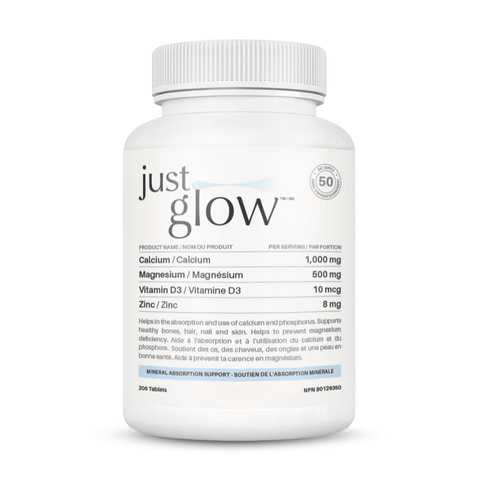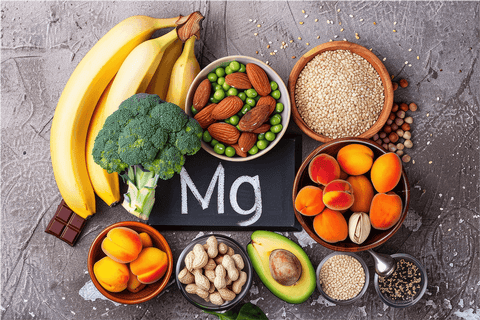Magnesium Bisglycinate vs. Magnesium Glycinate: Key Differences and Which One is Right for You?

Key Takeaways
-
Magnesium bisglycinate and magnesium glycinate are chelated forms of magnesium, known for their high bioavailability and gentle effect on digestion.
-
Magnesium bisglycinate consists of two glycine molecules, offering enhanced absorption.
-
Magnesium glycinate is a single glycine-bound form, providing a similar level of effectiveness but with slightly different properties.
-
Both forms support sleep quality, relaxation, muscle function, and overall well-being.
-
Choosing the right form depends on individual health goals, digestive tolerance, and specific needs like reducing stress or improving sleep.
What is Magnesium Bisglycinate?
Magnesium bisglycinate is a highly bioavailable magnesium supplement that consists of magnesium bound to two glycine molecules. This chelated structure allows for better absorption and minimal digestive discomfort, making it a preferred choice for individuals with sensitive stomachs.
Benefits of Magnesium Bisglycinate
-
High bioavailability for superior absorption
-
Gentle on digestion, reducing the risk of digestive issues
-
Supports muscle relaxation and recovery after exercise
-
Promotes better sleep quality and relaxation
-
Aids in managing stress levels
-
May support blood sugar levels and metabolic function
What is Magnesium Glycinate?
Magnesium glycinate consists of magnesium bound to a single glycine molecule. It is widely used for its calming effects and is often recommended for individuals looking to improve sleep and reduce anxiety.
Benefits of Magnesium Glycinate
-
Supports relaxation and sleep quality
-
May help reduce stress and anxiety
-
Aids in muscle function and recovery
-
Helps regulate blood pressure and overall cardiovascular health
-
Good option for individuals with magnesium deficiencies
Magnesium Bisglycinate vs. Magnesium Glycinate: Key Differences
|
Feature |
Magnesium Bisglycinate |
Magnesium Glycinate |
|
Structure |
Two glycine molecules |
One glycine molecule |
|
Absorption |
High bioavailability |
Also highly absorbable |
|
Digestive Tolerance |
Gentle on digestion |
Generally well-tolerated |
|
Sleep Support |
Excellent |
Excellent |
|
Stress Management |
Helps reduce stress |
Helps reduce anxiety |
|
Muscle Relaxation |
Effective for muscle recovery |
Supports muscle function |
Both forms are effective, but those with sensitive digestion or needing extra absorption may prefer magnesium bisglycinate. Those looking for general stress relief and sleep support might opt for magnesium glycinate.
How to Choose the Right Magnesium Supplement for You
When selecting between magnesium bisglycinate vs magnesium glycinate, consider the following:
-
If you have digestive issues, magnesium bisglycinate may be the best choice due to its gentle effects.
-
If you need better sleep, both forms work well, but magnesium glycinate is often recommended.
-
If you experience muscle cramps or tension, magnesium bisglycinate provides enhanced muscle relaxation.
-
If you're managing stress or anxiety, both forms support relaxation, but magnesium glycinate may be slightly more effective.
-
If you are looking for maximum absorption, magnesium bisglycinate offers a slight edge.
Potential Side Effects of Magnesium Supplementation
While magnesium bisglycinate and magnesium glycinate are generally well-tolerated, excessive intake may cause some mild side effects, including:
-
Digestive discomfort, such as bloating or diarrhea, particularly at high doses.
-
Lower blood pressure, which can be beneficial for some but may cause dizziness in others.
-
Possible interactions with medications, such as antibiotics or blood pressure medications.
To minimize side effects, start with a lower dose and increase gradually based on your body’s response.
The Role of Magnesium in Overall Health
Magnesium is an essential mineral that plays a vital role in numerous physiological processes, including:
-
Energy production and ATP synthesis
-
Muscle contraction and relaxation
-
Nerve function and neurotransmitter regulation
-
Bone health and calcium metabolism
-
Blood sugar regulation and insulin sensitivity
-
Cardiovascular health, including blood pressure regulation
Ensuring adequate magnesium intake through diet or supplementation can support overall well-being and reduce the risk of deficiency-related issues.
Choose Just Glow for High-Quality Magnesium Supplements
At Just Glow, we prioritize quality, bioavailability, and effectiveness in all our supplements. Our magnesium bisglycinate and magnesium glycinate formulations are carefully designed to support your health and wellness goals.
Explore our selection of premium magnesium supplements at Just Glow.
FAQs
1. Which form of magnesium is best for sleep?
Both magnesium bisglycinate and magnesium glycinate are excellent choices for sleep support, as they both contain glycine, which has calming effects.
2. Can magnesium bisglycinate cause digestive issues?
Unlike magnesium oxide or citrate, magnesium bisglycinate is gentle on the stomach and is less likely to cause digestive discomfort.
3. Is there a difference in elemental magnesium content between the two?
Both forms provide similar levels of elemental magnesium, but the bisglycinate form may be slightly better absorbed.
4. Can I take magnesium bisglycinate or glycinate daily?
Yes, daily supplementation is safe for most individuals. However, it’s always best to consult with a healthcare provider before starting any new supplement regimen.
Conclusion
Both magnesium bisglycinate and magnesium glycinate offer significant health benefits, particularly in supporting sleep, stress reduction, muscle relaxation, and overall well-being. While they are similar, magnesium bisglycinate provides enhanced absorption and is gentler on digestion. Magnesium glycinate is an excellent option for relaxation and stress relief.
For high-quality magnesium supplements that support your health goals, visit Just Glow today!
Summary
Magnesium plays a crucial role in numerous bodily functions, including muscle relaxation, nerve function, and bone health. Among the various magnesium supplements available, magnesium bisglycinate and magnesium glycinate are two highly bioavailable options. While they are similar, there are some key differences that may influence which one is best suited for your health needs.






